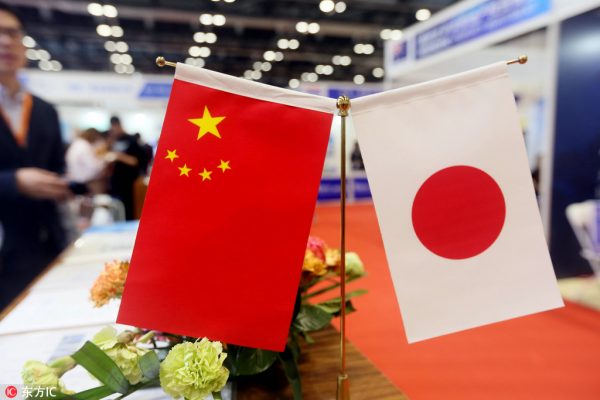
Li, Abe exchange messages, pledge to develop relations, deepen cooperation
Beijing is willing to work with Tokyo to safeguard political foundations, deepen mutually beneficial cooperation and properly manage differences under the principles of the four key bilateral political documents, said Premier Li Keqiang.
Li made the comment when exchanging congratulatory messages with Japanese Prime Minister Shinzo Abe on Sunday, the day marking the 40th anniversary of the signing of the China-Japan Treaty of Peace and Friendship, one of the four landmark bilateral pacts.
Forty years ago, the treaty was signed to legally confirm principles of the China-Japan Joint Communique, Li said of the statement in 1972. Bilateral ties have developed enormously since, bringing benefits to both peoples and contributing to regional and global prosperity and stability, Li said.
In May, Li paid an official visit to Japan, helping put bilateral relations back on the right track.
China is ready to work with Japan to comply with the four political documents, in the spirit of “taking the past as a mirror and looking forward to the future”, to promote long-term, sound and stable development of the ties, Li added.
Thanks to joint efforts, bilateral ties have witnessed substantial development in areas such as economy, culture and people-to-people exchanges, Abe said in his message.
The two countries should continue deepening cooperation and contributing to finding solutions to problems facing the international community, he said.
Abe spoke highly of Li’s visit to Japan, calling it tremendously vital for the future development of bilateral ties. He said he is looking forward to visiting China later this year to help bring China-Japan ties to a new stage.
In a related activity, at a symposium in Beijing on Saturday held to mark four decades since the 1978 treaty, over 100 government officials and academics from both countries gathered to honor the spirit of the treaty.
Former state councilor Dai Bingguo said the signing of the treaty summarized the political problems between the two countries and opened up a new chapter for bilateral ties.
“Japan has been supporting China’s economic development by providing capital and technological help and has also shared in the fruits of China’s fast development,” Dai told the symposium hosted by the Chinese Academy of Social Sciences.
Yukio Hatoyama, former Japanese prime minister, said in a speech at the event that the two neighbors have gradually established governmental dialogue mechanisms at various levels and enhanced people-to-people exchanges since the treaty was signed 40 years ago.
The treaty was signed based on the political insights at the time of leaders from both sides, including looking at the bigger picture and properly handling sensitive issues, and bilateral ties also suffered twists and turns over the past four decades due to historical and territorial factors, Hatoyama said.
He added that the two sides should look at the bigger picture and reach a consensus on shelving differences, and Tokyo should seize the opportunity to work with Beijing under the Belt and Road Initiative.
Yutaka Yokoi, Japanese ambassador to China, said both countries are major economic powers and share great responsibility in the global community, and he is impressed by China’s achievements over the past 40 years, especially in the field of science and technology.


